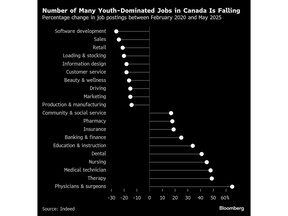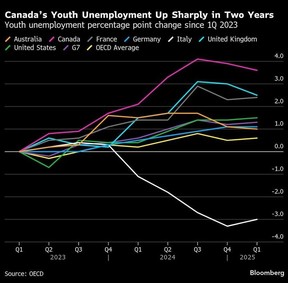Canada's youth job market slumps most among major economies
While Canada’s youth jobless rate of 13.4% in the first quarter wasn’t the highest in the OECD it rose the quickest

Article content
Young Canadians are facing a labour market that has deteriorated faster than in any other major advanced economy.
Over the past two years, unemployment among 15 to 24 year-olds in Canada jumped 3.6 percentage points, the sharpest increase among the 25 largest economies in the Organization for Economic Co-operation and Development — including the US, UK and Australia.
While Canada’s youth jobless rate of 13.4% in the first quarter wasn’t the highest in the OECD — Spain’s was 26.2% — it rose the quickest of the leading nations. Among all 38 OECD countries, Canada still had among the biggest jumps, behind only six nations including Finland and New Zealand. And much of the pain unfolded before US President Donald Trump’s tariffs began pummeling hiring and investment.
Sharp increases in post-pandemic immigration and an economy that is highly sensitive to US trade policy appear to be driving the employment decline. A cooling economy, business closures, rising automation and shifts in consumer behavior are all rapidly depleting jobs for young people.
As of May, one in seven Canadian youth can’t find work, and they’re more than twice as likely as other age groups to be unemployed. Outside of the pandemic, the last time their jobless rate was this high was during the global financial crisis — and an expected tariff-driven downturn doesn’t bode well for their futures.

This is the first summer Lorenzo Eby, a 17-year-old high school student in Toronto, is seriously searching for a job. But after two months and some 200 applications, he has yet to hear back from a single employer.
“Even my brother — who’s older than me, 21, and looking for full-time jobs — can’t find anything,” Eby said. The teenager is heading back to finish high school at the end of the summer and hopes to study engineering in university, but his job prospects after that are unclear.
“I don’t know how that’s going play into things — having an actual degree — and whether I’m going to end up applying for the same job I am now, but with more qualifications.”
At the start of summer job season last month, the unemployment rate among returning students ages 15 to 24 reached 20.1%, a 3.2 percentage-point jump from a year ago.

“A 20% unemployment rate for any group looks like a recession,” said Armine Yalnizyan, economist and Atkinson Foundation fellow on the future of workers. “That’s not a healthy sign for a labor market. And as we try and skate our way out of whatever the trade issues, we’re not entering a happy period of the Canadian economy and young people are taking it on the chin.”
Influxes of foreign students and temporary workers helped push Canada’s population growth rate to among the world’s highest in 2023, causing the number of people looking for work to surge. Since then, the Liberal government’s immigration pullback has started to temper the gains. Still, the youth unemployment rate has stayed near the current level for much of the past year.
Declining employment in sectors that typically hire youth — including retail, food and accommodation — now appears to be playing a key role. A slowing economy due to the trade war, combined with increased automation and shifting consumer habits, seem to be wiping out jobs in the sectors, increasing competition among students and graduates alike.
“Youth are more likely to be job seekers. They’re more likely to be in and out of the labor market because they have less experience and might not be employers’ first choice,” said Brendon Bernard, senior economist at job-listing website Indeed. “Youth are the ones who benefit when employers are looking to hire a lot, and are the ones who are hit harder when employers’ hiring appetite pulls back.”
But even young people who aren’t hunting for a job are struggling. Limited opportunities for career and income growth and higher costs for housing and other essentials have resulted in lower living standards. That’s a reality for Adrian Penny, a self-employed video producer who’s renting what he suspects is “Canada’s smallest apartment” — it can fit inside a parking space.
When Penny was let go from an architecture firm, he wanted to start his own videography business. But then the pandemic began. After being forced out of an apartment so the owner could move back into the unit, and facing post-Covid rent surges elsewhere, he decided to make a 95 square-foot space his home and office. That has kept his housing expenses at about C$700 ($510) a month.
“If I were working full-time, having a steady paycheck every two weeks, I’d probably wouldn’t be in this apartment. Because of the unpredictability of my income, I really like not having to worry too much about paying rent,” he said. “I look at myself as a starving artist. In my mind, it lets me justify sacrificing luxury in order to create.”
While gross domestic product in the first quarter outperformed expectations, economists in a Bloomberg survey anticipate two quarters of contractions starting in April. They expect Canada’s overall unemployment rate to rise to as high as 7.8% by year-end, reaching the highest level since early 2011 outside of the pandemic, from 7% currently. GDP growth is seen averaging 1.2% in 2025, a deceleration from 1.6% last year.
“When you’re hovering around 1% growth, it doesn’t take much to knock you over into a recessionary period,” Yalnizyan said. “Recessions are never good for young people. But we have been looking at youth unemployment rates being much higher than they were historically even before the recession was on the horizon, so you know it’s going to hit that group harder.”











Postmedia is committed to maintaining a lively but civil forum for discussion. Please keep comments relevant and respectful. Comments may take up to an hour to appear on the site. You will receive an email if there is a reply to your comment, an update to a thread you follow or if a user you follow comments. Visit our Community Guidelines for more information.